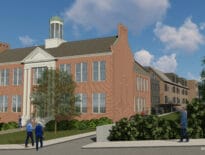
Hobbs Brook Management’s 500,000-square-foot office and lab building under construction at 225 Wyman St. in Waltham will include a generous component of outdoor amenities including permeable walkways, seating areas, walking trails and courtyards. Image courtesy of Gensler
As recent as six months ago, transit-oriented urban projects were one of the hottest trends in real estate development. Class A tenants wanted to be amid bustling, mixed-use areas with entertainment and dining options for the after-work crowd. The goal was to create high-quality office space with urban amenities that provided tenants with a 24/7 experience.
Fast-forward to today. The coronavirus pandemic continues to keep people at home. Businesses are being forced to rely on virtual technology instead of in-person meetings. Many workers will not return to the office at all, while others wait for direction from their employers.
State and public health guidelines will drive future development. In the near term, highly engineered buildings, with flexible floor plans and large conference rooms and attractive open space for social distancing, are in demand.
The impact of coronavirus on commercial development and building occupancy will not be fully known for some time. However, three main trends have emerged as part of the state’s phased reopening.
Buildings Designed with Legroom
Tenants were previously trying to densify and consolidate to create savings and collaborative workspaces. In the near term, this trend will reverse, with tenants utilizing creative space planning to enable employees to work at a safe and secure distance while maintaining a sense of community and culture.
Tenants in the market will need more space, not less, to accomplish this. Buildings with big blocks of vacant space will be well positioned to respond to the need to de-densify, create larger conference rooms and gathering areas and build private offices and workspaces to support social distancing while still fostering a sense of collaboration.
Another trend which is certainly not new but is of increased value are healthy, or “green,” buildings. Buildings that are healthy on the inside and out promote wellness and increased productivity as well as having proven cognitive benefits.
Property that is well–engineered with robust HVAC systems will be valued going forward. The ability to cycle fresh, clean air through tenant spaces and common areas will go a long way toward creating safe work environments. More importantly, tenants will feel more comfortable bringing their employees back to the office knowing the landlord has taken the proper precautions.
Recently renovated, 81 Wyman St. in Waltham is one of only nine buildings certified LEED Platinum for core and shell in Massachusetts and is the 10th LEED-certified building in the Hobbs Brook portfolio. A 680-kilowatts peak DC solar array was installed to provide covered parking for 113 spots for building tenants. Solar power systems help decrease energy consumption and greenhouse gas emissions, save money and achieve measurable results in the fight to address climate change. Driven by its commitment to reduce its carbon footprint, Hobbs Brook boasts eight buildings in its portfolio with solar arrays.
Reconnecting with Nature
Landlords are increasingly focusing on amenities which promote a balanced lifestyle. Suburban commercial developments along Route 128 have the advantage of acreage, offering access to walking paths and nature. At the same time, the buildings are close enough to Boston for short trips in and out.
Biotech and corporate tenants interested in moving employees from congested markets like Cambridge could be drawn to a large campus in the suburbs. We are currently developing 500,000 square feet of class A lab and office space at 225 Wyman St. in Waltham. It is expected to be delivered in the first quarter of 2022. Aside from available vacant space, the campus itself is an amenity. The site’s landscape plan will include both paved and permeable walkways, seating areas and walking trails with two courtyards for people to safely gather outside.
 To sweeten the deal for tenants at the Hobbs Brook Waltham campus, there are 300 to 400 beehives and there will soon be fresh produce thanks to a partnership with local businesses. The goal is to grow organic produce to supplement the food service program, offer educational opportunities for tenants and maybe even harvest enough to donate to local food pantries. There is currently an “edible landscape” of vegetable gardens throughout the campus at 404 Wyman St. with plans to expand this program to Waltham and Wakefield.
To sweeten the deal for tenants at the Hobbs Brook Waltham campus, there are 300 to 400 beehives and there will soon be fresh produce thanks to a partnership with local businesses. The goal is to grow organic produce to supplement the food service program, offer educational opportunities for tenants and maybe even harvest enough to donate to local food pantries. There is currently an “edible landscape” of vegetable gardens throughout the campus at 404 Wyman St. with plans to expand this program to Waltham and Wakefield.
Sam Schaefer is the president and CEO of Waltham-based investment management and development firm Hobbs Brook Management.




 |
| 

